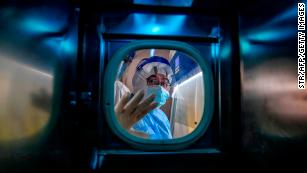As Wuhan emerges from coronavirus lockdown, residents are finally lining up to bury their dead
Minutes after Wuhan reopened its borders at midnight Wednesday, after a 76-day lockdown, Zhang Hai got in his car and left the city where he lost his father to the novel coronavirus.
"My heart was broken in Wuhan," he said of his hometown in central China, the original epicenter of the now global pandemic. "Inside, I'm filled with grief, and anger."
Less than three months ago, the 50-year-old had driven the 700 miles from the country's southern coast to Wuhan with his father Zhang Lifang, who needed treatment for his broken leg.
"Because I didn't know how bad the outbreak was in Wuhan, I took my father there -- it was basically sending him to death.
Zhang Hai, a grieving son
His father had retired in Wuhan, and enjoyed free medical treatment in the city.
The surgery went smoothly. But Zhang Lifang was infected with Covid-19 while recovering in hospital. He was diagnosed on January 30 and died two days later, aged 76.
"Because I didn't know how bad the outbreak was in Wuhan, I took my father there -- it was basically sending him to death. Whenever I think of it, I am overwhelmed by remorse and anger," he said Wednesday, on his long drive back to Shenzhen, where he lived with his father.
But Zhang will have to return to Wuhan -- because his father's remains are stored at a funeral home in the city.
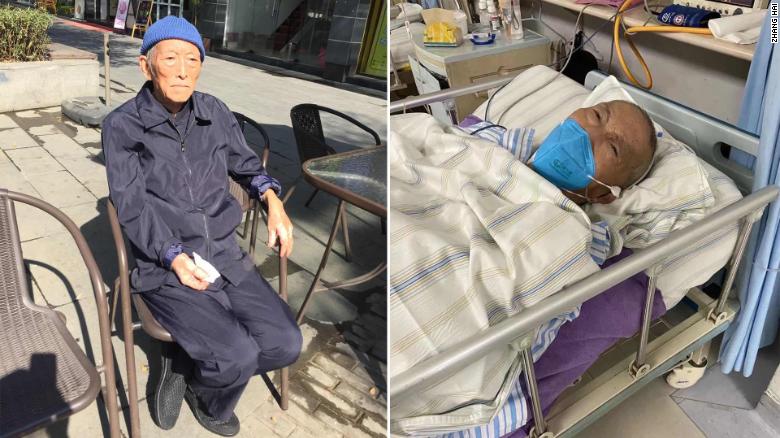
Zhang Hai's father, 76, died from the coronavirus on February 1 after being infected in a hospital in Wuhan.
This week, people in Wuhan are going back to work, businesses and shops are reopening, and cars and pedestrians are back on the once-deserted streets, but for many people like Zhang, Wuhan will never be the same.
The coronavirus has claimed more than 2,500 lives in the city, accounting for 77% of all Covid-19 deaths in China, according to the National Health Commission.
As life starts to regain some semblance of normality, thousands of bereft families are faced with a task that has been put on hold for months: burying their loved ones.
Grief put on hold
On January 25, the Wuhan government banned all funerals in the city, amid sweeping lockdown measures to contain the outbreak, according to a notice by the municipal civil affairs bureau seen by CNN.
Cemeteries were ordered to close, too.
With most Wuhan residents unable to leave their homes, transport shut and funerals off, the remains of thousands of people who died both from coronavirus and other causes were stored at funeral homes. Families were told to await government advice on when they could be collected.
Many would not get to see the body of their loved ones before cremation. To curb the spread of the virus, the authorities decreed that all bodies of confirmed and suspected coronavirus patients must be taken directly from hospitals to funeral homes for cremation, according to a notice issued by the National Health Commission.
Like everything else in the city, the normal process for dealing with grief was put on hold.
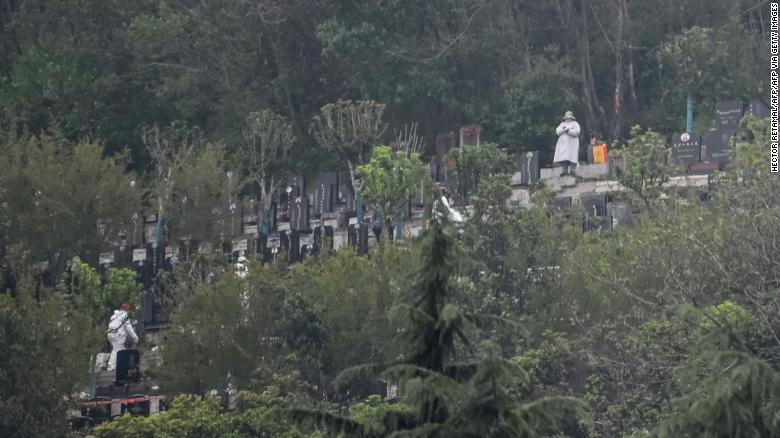
Wuhan residents had been unable to bury their loved ones for months, as authorities banned funerals and shut cemeteries to cut coronavaris risks.
Late last month, as the number of new local infections dropped to zero, Wuhan residents were finally allowed to retrieve the ashes of their relatives from funeral homes and find them a resting place, reported the state-run Changjiang Daily, citing an official from the municipal civil affairs bureau.
Since then, photographs of long lines snaking outside funeral parlors have circulated on social media, highlighting the tragedy facing families across the city. The scenes outside funeral homes were quickly censored on Chinese social networks and received little coverage on state media, only being reported by a handful of relatively outspoken Chinese media outlets.
Zhang, the Shenzhen resident, had been anxious to bury his father, who had worked at a Wuhan university before retiring.
However, he says that he was contacted by his father's previous workplace and told he could not collect the ashes from the funeral home unless he was escorted by someone from the university, or a neighborhood committee worker.
Lockdowns are being imposed around the world. China's example highlights the costs
In China, every residential community is managed by a neighborhood committee, a local arm of the Chinese Communist Party, charged with maintaining grassroots stability and order. Since the outbreak, community workers have been tasked with epidemic control in residential compounds, coordinating with hospitals and disease control authorities.
Zhang said he was "repulsed" by the idea of strangers intruding on the last moments with his father's remains.
"Taking care of my father's last affairs -- be it collecting or burying his ashes -- is something I want to do by myself, because it's an entirely private matter. Those people are not my family," he said.
In the end, Zhang refused to accept the forced escort and declined to pick up his father's ashes.
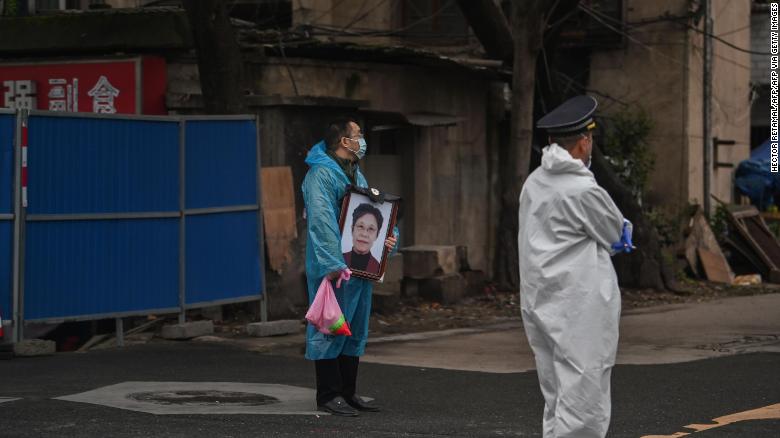
A man wearing a mask and a blue raincoat holds a portrait as he stands outside the Biandanshan cemetery in Wuhan on March 31.
His account of needing an escort to collect his relative's remains was echoed by others on Chinese social media, in multiple posts seen by CNN.
The arrangement has sparked anger among other Wuhan residents.
"After reading about (what's happening at) the funeral homes in the past days, as a Wuhanese I feel really sad. Why are we Wuhan people not allowed the right to mourn? Are we only allowed to be immersed in the celebrations of victory?" wrote one Weibo user, referring to China's successful effort in eventually containing the outbreak.
The Wuhan government did not respond to CNN's request for comment regarding the arrangement.
Quiet burials
Others have spoken of a strangely reserved atmosphere at funeral homes and cemeteries under these conditions.
Peng Yating, a 34-year-old education consultant, rushed to the Biandanshan Cemetery in Wuhan in the first light of dawn on March 28.
Every spring, Peng and her mother visited their ancestors' graves at this cemetery on Qingming Festival, the centuries-old tradition of Chinese families honoring loved ones by cleaning their graves -- a practice known as "tomb sweeping."
But this year she went to the cemetery for a different reason.
Peng was there to select a burial plot for her mother, who died in hospital in late January, when the novel coronavirus was sweeping Wuhan.
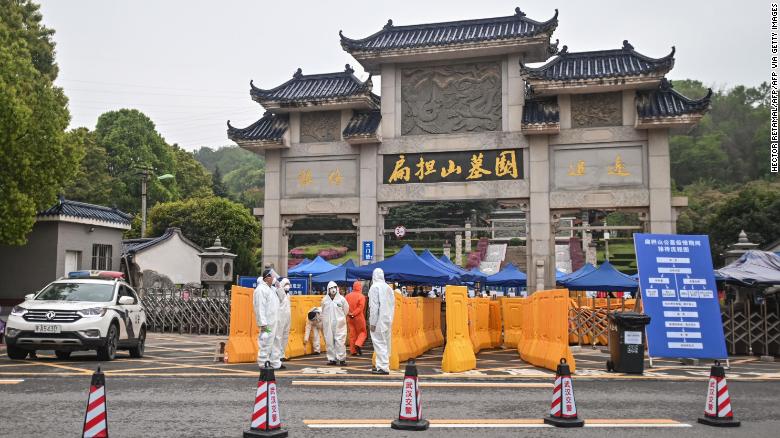
People wearing hazmat suits standing guard at the entrance to the Biandanshan cemetery in Wuhan on March 31.
When Peng arrived at the Biandanshan Cemetery to choose her mother's grave last Saturday before 6:30 a.m., there was already a long queue of grieving relatives outside. Her ticket said she was the 71st in line.
"Perhaps because it was still early, today's cemetery was eerily quiet. Many family members have come, but they did not make noise, cry, or express their disaffection. They were just silently standing in line, waiting for their number to be called," she wrote in a post on Weibo, China's Twitter-like platform.
"The dead can no longer speak, but the living did not want to speak either."
Funerals are still not permitted. One grieving mother in Wuhan, who did not want to reveal her name, said she was going to bury her daughter at a cemetery on Thursday with her husband and her niece.
"There will be no ceremonies. There's no way to hold any. We can only bury (her) quietly," she said, over the phone.
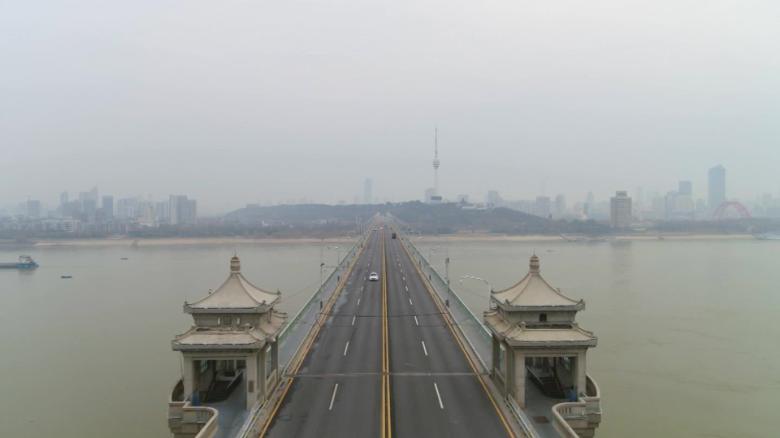
The lockdown on Wuhan was lifted on April 8, 76 days after the city was sealed off from the world.
Hundreds of miles away in Shenzhen, Zhang returned home Thursday after passing a nucleic acid test -- all Wuhan returnees have to go to hospital to get tested for coronavirus, as required by many local governments across China.
In his apartment, he could not stop thinking of his father and blaming himself for taking him to Wuhan on January 17.
Back then, Wuhan officials and health experts insisted there was "no obvious evidence for human-to-human transmission" and that the coronavirus was "preventable and controllable."
Zhang said he was still waiting for the Wuhan government to make an official apology.
"Those officials who did not make public the information in time should be punished," he said.
CNN's Joshua Berlinger contributed reporting.


